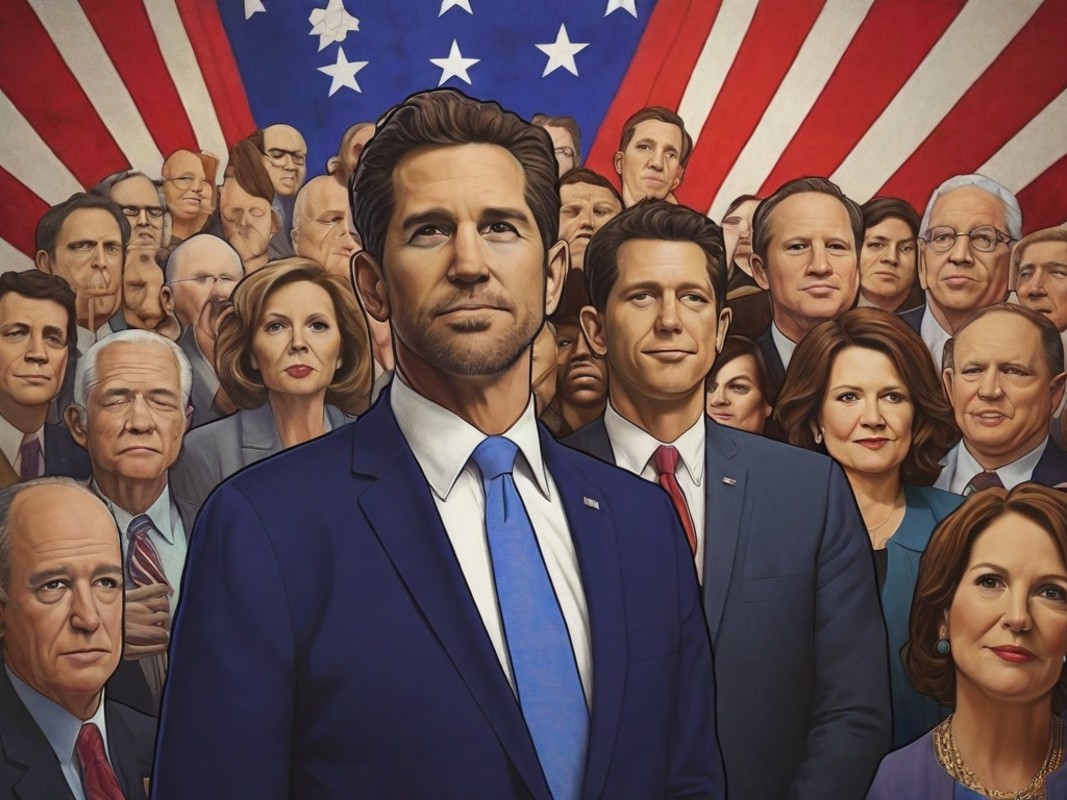Democrats
Democrats Must Embrace Bitcoin To Survive
Published
5 months agoon
By
admin

I, like many of you, am processing the results of the recent U.S. election in which Donald Trump won handily both the electoral college and popular vote. As pundits discuss, left mainstream media personalities mourn, and yes many Trump supporters cheer ecstatically, as a progressive Bitcoiner it’s entirely clear to me: If the Democratic Party wants a future in America, it must embrace Bitcoin.
Let me explain what I mean. Not only do I think is it imperative for the party to embrace Bitcoin if it wants to survive, but after this decisive Trump victory, I think many within the party, and those independent voters who dip in and out of voting for democratic candidates, are looking to make a drastic change and go back to the drawing board.
Bernie is back, and he has something to say.
It should come as no great surprise that a Democratic Party which has abandoned working class people would find that the working class has abandoned them.
While the Democratic leadership defends the status quo, the American people are angry and want change.
And they’re right. pic.twitter.com/lM2gSJmQFL
— Bernie Sanders (@BernieSanders) November 6, 2024
Now that Biden’s term is coming to a close, and Harris conceded the race in defeat, Bernie isn’t mincing words with his criticism of the democratic party and priorities. “It should come as no great surprise that a Democratic Party which has abandoned working class people would find that the working class has abandoned them.” Many within the party, and former Bernie supporters who perhaps are not in the party or supportive any longer, have been beating this drum for a while: Democrats favor coastal elites, who opine about progressive politics and “wokism” intellectually, while paying lip-service (and patronizing various other minority groups) to working class americans. After losing to Donald Trump twice, many democrats, progressives, and certainly independent and democratic american voters are wondering, where do we go from here?
Trump is a tour de force. A charismatic figure that has truly altered the course of American politics in ways the GOP, strategists, journalists, and the political establishment never thought was possible. The democratic party has been struggling to come up with answers against Trump and MAGA populism after 2016. While mainstream media may continue to cast his victories as the product of racism, sexism, or other beliefs steeped in identity politics, the same they did in 2016, many within the party are accepting that the strategies around identity politics, anti-Trump, and some moral high ground are decisively ineffective.
While we all will be analyzing data, voter profiles, trends, etc over the next several months, many journalists, including some quite influential progressive leaning media outlets including Pod Save America, Breaking Points, and beyond conceded that the Democratic Party must return to being the party of working people and focus on the economy and inflation, which was one of the most important issues for voters at the polls this year. The Democratic party period from 2016-present has focused heavily on identity politics, what many deem as “wokism” and more, which I wouldn’t discredit out right. Much of this is important. But, the weight and prioritization of these issues over economic and other hardships Americans face has been the issue. Many democrats and progressive knew this, but now we have data and election results to prove that it is not a winning strategy for the party, particularly in the presidential election.
Being a progressive and Bitcoiner is quite a unique position to be in, and it’s helped me analyze the world and predict certain trends and outcomes in interesting ways that often times bitcoiners, or progressives outside of the bitcoin bubble, miss. In fact, I’m not alone. Many of the outspoken progressives and left-leaning folks in the bitcoin space were former Bernie bros, inspired by Occupy Wall Street and other populist economic messages around wealth inequality, corporate capture in America, Big Bank bailouts and the 2008 Global Financial Crisis. Many of us have been turned off by the party’s pivot away from these battles, even to the point where Senator Elizabeth Warren has been working with and funded heavily by Big Banks, not to mention her and many others extreme hostile takes against the revolutionary technology born in the wake of the Global Financial Crisis: Bitcoin.
Here’s my take: Not only must the Democrats embrace Bitcoin to have a political future in America–I think many current and former members would be much more open to it. Rep. Ro Khanna is one leading example of a progressive democrat who understands where the Democratic Party has been losing ground to the Republicans on economic issues and Bitcoin. At the Bitcoin conference in Nashville this past summer, Rep Khanna stated, “Being against Bitcoin is like being against cell phones or the laptop, or semi conductors, it’s a technology.” Bitcoin is for freedom.”
Bitcoin advocates and campaign funding played a huge part in this year’s presidential election. While most democrats and the Harris campaign chose to mainly ignore Bitcoin and the industry, with some neutral or vague support of technology mentioned here and there, after a hostile four years under the Biden administration, this appears to be an error they couldn’t afford to make. Many progressives and democrats may continue to speak out against the industry and the campaign financing and superpacs that brought in Big Crypto Money (which campaign financing and then bitcoin the technology are two different things), but it’s an issue that can no longer be ignored, and almost weekly seems to be growing more and more bi-partisan (including ownership of Bitcoin in America, shown to be exceptionally broad and diverse across the political spectrum from a recent survey conducted by Colin Brown, Troy Cross, and Andrew Perkins).
Donald Trump and the GOP have used and garnered the single issue crypto voters in big ways. Campaign promises include protecting the right to self-custody, a U.S. Bitcoin Strategic Reserve, to support the crypto and bitcoin mining industries, Free Ross, and more. We’ll see if he makes good on these promises, and it’s unclear how big of an impact Trump’s pro-crypto positions had on the election outcome, but it’s not negligible. And if anything, it also symbolized what we saw was very important for American voters– a big shift from the current administration, and big promises regarding the economy and economic prosperity for America.
As the Democrats head back to the drawing board to determine the future of the party and their priorities, many are ready to go big, unburdened by what has been (sorry, had to) with the Hilary, Biden, Harris neo-liberal coalitions. And there’s one good place to start–the economy, stupid! Affordability, inflation, and hope in a brighter economic future for middle class and working families are winning priorities and what Americans at the end of the day show up in huge numbers to vote for. Bitcoin has a significant role to play in this approach and messaging, as an inflation hedge, incredible savings technology for working families, censorship resistant payments (should progressive activists find themselves in positions to need resistance money against Donald Trump’s authoritarian policies), and beyond. If the Democrats are serious about getting back to some of their roots as the party of working class people, including an olive branch to former independent and Bernie supports who are passionate about fighting for financial freedom and a better living for working class Americans, Occupy, and beyond, they will find Bitcoin is an incredible tool to that end. With Bitcoin there is no barrier to ownership, no middleman, not broker or bank you must use or be “accredited” by
Permissionless, freedom money. Can this be a rallying cry for the next chapter in the progressive movement and for Democrats to utilize on the campaign trail? It almost seems inevitable…a when, not an if…that the Democratic party capitulates to Bitcoin and the American people’s demands, or face extinction. Myself, Margot Paez, and others from The Progressive Bitcoiner will certainly be here to advocate for a rebirthing of the progressive movement, powered by Bitcoin.
This is a guest post by Trey Walsh. Opinions expressed are entirely their own and do not necessarily reflect those of BTC Inc or Bitcoin Magazine.
Source link
You may like


Kyrgyzstan President Brings CBDC a Step Closer to Reality


Manta founder details attempted Zoom hack by Lazarus that used very real ‘legit faces’


Ethereum Price Fights for Momentum—Traders Watch Key Resistance


Corporate Bitcoin Holdings Hit Record High In Q1 2025 As Public Companies Accelerate Accumulation


‘Big Short’ Investor Steve Eisman Derisks, Says Stock Market Volatility Will Be Here for a While


Dow drops over 500 points as UnitedHealth tanks, Fed tensions weigh on markets
Bitcoin
Congressman Ro Khanna Says Democrats Are Changing Their Tune On Bitcoin
Published
3 weeks agoon
March 28, 2025By
admin
On March 11, 2025, Rep. Ro Khanna gave a short but impactful talk at the Bitcoin Policy Institute’s Bitcoin for America summit.
“Bitcoin is transformational for so many people around the world,” Rep. Khanna stated at the summit. “That is why the Democratic Party should be embracing it as something that can create financial empowerment for people not just in the United States, but around the world.”
This is the type of message he’s been spreading for years now, and he’s urged his fellow Democrats to follow his lead. He’s implored them to not be scared of Bitcoin but to view it just as they view other major technological advancements of our time, including the internet itself.
“My goal is to make Bitcoin bipartisan,” Rep. Khanna told Bitcoin Magazine. “I want to convince Democrats that bitcoin is a next-generation store of value that millions of people around the world use and that America showing leadership on it allows us to connect with these people, often some of the most disenfranchised.”
For a party that often advocates for financial inclusion, it seems almost ironic that so many Democrats have looked past Bitcoin, an open-source technology that anyone can use with nothing more than an internet connection (and, in some cases, even without one).
With that said, Rep. Khanna made the point that, while he remains one of the few more vocal Democrats when it comes to being pro-Bitcoin, the number of Democratic politicians who have stated that they’re in favor of the technology has increased substantially over the past few years.
“We went from just 10 of us or so supporting Bitcoin and crypto to almost 70 or 80,” said Rep. Khanna. “It’s happening slowly.”
And while some have attributed to malice most Democrats’ historical stance on Bitcoin, Rep. Khanna claims the issue is more a lack of understanding of the technology’s purpose and use cases.
“Some Democratic politicians are not aware of how helpful Bitcoin can be with remittances or how it can be used by those who don’t have access to U.S. dollars,” said the congressman. “Many people around the world use it for both reasons,” he added, alluding to the idea that many, including some Democrats, might not be aware of this fact.
The Bitcoin And Crypto Voting Bloc In U.S. Swing States
According to research from Coinbase, in each of the swing states in the most recent U.S. presidential election, there were about 10 times the number of crypto holders compared to the vote differential between Biden and Trump in 2020.
Harris lost to Trump in each of these swing states, leaving some to speculate that the turnout of the Bitcoin and crypto voting bloc may have been one of the primary forces that swayed the election in Trump’s favor.
While Rep. Khanna doesn’t know to what extent this voting bloc impacted the election results, he agreed that it was likely one of many major factors that affected the outcome of the election.
“I think it made a difference,” said the congressman. “In such a close election, everything matters, and the fact that there were some Democrats who offended Bitcoin and crypto voters was not helpful.”
And Rep. Khanna is not alone in acknowledging this.
In December 2024, at the New York Times DealBook Summit, Van Jones — political analyst, media persona, and prominent voice within the Democratic party — stated that it was to the Democratic party’s detriment that it shut out pro-Bitcoin and pro-crypto voters.
Rep. Khanna sang Jones’ praises and said that we should be hearing more voices like Jones’ within the Democratic party speaking up in favor of Bitcoin in the near future.
“I have a lot of respect for Van Jones,” said Rep. Khanna.
“He spent some time in the Bay Area, so he gets technology. The party will be moving in a direction that’s going to embrace Bitcoin and other technologies,” he added.
Will President Trump’s Embrace Of Bitcoin Deter Democrats From Supporting It?
While it only seems logical that the Democratic party would reverse its stance on Bitcoin if it’s looking to pick up seats on the House and Senate come the 2026 midterm elections, it simultaneously seems difficult to imagine more Democrats coming out in support of Bitcoin given the highly partisan political climate in the U.S. coupled with the fact that President Trump is an ardent Bitcoin supporter.
Rep. Khanna argued that Democrats shouldn’t be thinking along party lines when it comes to Bitcoin, but rather assessing the technology based solely on what it is.
“Politicians are capable of evaluating Bitcoin on its merits,” said Rep. Khanna.
“Bitcoin is just a decentralized digital currency that enables peer-to-peer transactions without a need for an intermediary. People just need to study Bitcoin and learn that it’s just a medium of exchange,” he added.
Rep. Khanna also took a moment to differentiate between Bitcoin and meme coins, highlighting the fact that the president’s recently released coin ($TRUMP) creates much confusion regarding the value proposition of crypto assets, including bitcoin.
“We shouldn’t have elected officials like President Trump launching meme coins,” said the congressman.
Getting Democrats on the Right Side of History
At a time when many U.S. citizens are struggling to make ends meet, should Bitcoin be a front-and-center issue for Democrats, once widely regarded as the political party of the middle and working class?
Rep. Khanna doesn’t necessarily think so, but he also doesn’t think the party should continue to pooh-pooh the technology.
“There are far bigger issues at hand right now like the cuts in Medicaid, the firing of veterans, and the erratic policy of tariffs,” the congressman explained.
“But the Democrats were on the wrong side of issues of innovation and Bitcoin in 2022 and 2024, and we now have an opportunity to get on the right side of it,” he added.
So, how can pro-Bitcoin Democrat voters help to get their party on the right side of history when it comes to Bitcoin?
Rep. Khanna had a few suggestions:
“They should point to those of us who are leading on Bitcoin and crypto,” he said.
“They can encourage members of government to study the issue, so that they’re not uninformed,” he added.
“And they should talk about the enormous adoption of Bitcoin.”
Source link
bitlicense
Democrats Propose More Bad Bitcoin And Crypto Regulation
Published
3 weeks agoon
March 25, 2025By
admin
On Friday, Maryland Delegate Adrian Boafo (D) and New York Assemblyman Clyde Vanel (D) sent a joint letter to Democratic Congressional leaders urging them to pass comprehensive crypto legislation at the federal level.
In the letter, the elected officials cited New York State as being a leader in crypto regulation and proposed that New York’s BitLicense be used as a model for what federal crypto regulation should look like. The letter’s authors also noted that New York State has placed a two-year moratorium on proof-of-work cryptocurrency mining that uses fossil fuels (seemingly citing this as something else the federal government might consider doing).
It was upon reading these points in the letter that I realized that Democrats are capable of putting forward Bitcoin and crypto policy ideas stupider than what former Vice President Harris proposed in October 2024, which was “a regulatory framework for cryptocurrency and other digital assets [that protects] Black men who invest in and own these assets.”
(Please note that I’m in favor of a regulatory framework that protects the right of Black men to invest in crypto assets. I’m also in favor of one that protects the right of Asian men, Hispanic men, White men, and Indigenous men to do the same. Oh, and I’d like for whatever Bitcoin and crypto policy we craft here in the U.S. to protect the right of women and transgender people of all races to invest in bitcoin and crypto, as well.)
With that said, let me break down why the U.S. federal government’s creating something comparable to New York’s BitLicense and putting a mining moratorium on Bitcoin miners that use any amount of fossil fuels would be a bad idea.
And please forgive me in advance for being emotional at points. This issue is personal to me, as I’m a resident of New York State and have experienced firsthand the damage that politicians and bureaucrats have done to the Bitcoin and crypto industry in the state.
The BitLicense
New York State requires that all virtual currency businesses that operate in the state obtain a BitLicense.
At face value, obtaining a license to operate a business seems harmless enough. But once you learn that it takes months to years to complete all of the paperwork and to jump through all of the hoops required to obtain one and that it costs upward of $100,000 to go through this process, you quickly see why so many established companies in the space — never mind the early-stage start-ups — don’t even start the process.
Because of the BitLicense, New York State residents cannot use reputable platforms like Strike, River, Swan, and Kraken. Nor can they use Lightning on CashApp or the fiat-to-bitcoin exchange on Fold. This is only to name a few of the Bitcoin/crypto products and services that we can’t use because of red tape.
But what’s perhaps more of a slap in the face is that when you attempt to use some of these platforms as a New York State resident, you’re presented with messages such as “This exchange doesn’t serve residents of jurisdictions including New York State, Iran, Syria and North Korea.”
TRULY FUCKING STAGGERING THE COMPANY THAT NEW YORK POLITICIANS AND BUREAUCRATS HAVE PUT NEW YORK RESIDENTS IN.
If we were to apply the BitLicense on a federal level, we would deeply stifle innovation and entrepreneurship, as not only would we greatly hinder the Bitcoin and crypto companies that have the money and resources to go through the process of obtaining a federal BitLicense, but we’d create a moat around them while creating a scenario in which the start-ups that can’t afford to go through the process either close up shop or simply not serve U.S. citizens.
A federal BitLicense would be a major hindrance to President Trump’s accomplishing his goal of making the United States the Bitcoin superpower and the crypto capital of the world. (Maybe that’s why these Democrats proposed it?)
The Mining Moratorium
While I know that burning fossil fuels is detrimental to the environment and I believe that human-made climate change is a real thing, I’m also a proponent of people being gainfully employed and industries being able to flourish.
And in upstate New York, there’s been a notable lack of both since factories began closing down in the region after World War II.
What’s replaced gainful employment in factories in many parts of upstate New York are service-sector jobs that barely enable workers to make ends meet.
The urban blight in most cities in upstate New York is so palpable that it’s nauseating.
What we could do to revive upstate New York is invite the Bitcoin mining industry in. Sure, Bitcoin mining companies might burn some fossil fuels to power their operations at first, but as Bitcoin mining incentivizes renewable energy production, they could move away from fossil fuels as their source of energy.
Also, if the likes of Assemblyman Vanel and New York State’s governor, Kathy Hochul (D), are so against companies that burn fossil fuels then 1) Why haven’t they put a moratorium on all companies in the state that use fossil fuels? and 2) Why haven’t they enacted laws that do things like stopping all New York residents from using cars that have internal combustion engines?
I ask these questions rhetorically, as I know I’d never get answers from either of them on this, because the mining moratorium is more for show — virtue signaling, if you will — than anything.
If they really wanted to make a concerted effort to stop the environmental damage that burning fossil fuels causes in New York, they’d do much more than prohibit Bitcoin mining companies that use fossil fuels from operating in the state (and they’d take down the economy of New York in the process).
If we were to apply such a mining moratorium on a federal level, we’d not only put many Americans out of work, but we’d also cede much of the hashrate to hostile foreign powers who are using fossil fuels to mine bitcoin anyway.
My Plea To Democrats
Please stop proposing regulation that will hurt an industry that could otherwise provide many Americans with high-quality jobs.
Please stop listening to the likes of Delegate Boafo, Assemblyman Vanel, or any of the backward-thinking Democrats to which this letter was addressed, including Rep. Maxine Waters (D-CA) and Senator Elizabeth Warren (D-MA).
Instead, start taking queues from more forward-thinking Democrats like Congressman Ro Khanna (D-CA), Congressman Ritchie Torres (D-NY), and former Congressman Wiley Nickel (D-NC), politicians who would like to see Bitcoin and the industry that surrounds it succeed in the United States.
Source link
crypto
Democrats Should Reverse Their Stance On Bitcoin
Published
3 months agoon
January 8, 2025By
admin


Last month at the New York Times DealBook Summit, political analyst and media personality Van Jones admitted that the Democrats made a fatal mistake in not only largely disregarding the crypto voter but in acting against them during the last election cycle and more broadly during President Biden’s time in office.
“50 million people bought some crypto — that’s a bet on [the] future,” said Jones.
“They’re trying to get to a better future. Joe Biden, Kamala Harris, Elizabeth Warren beating the hell out of crypto was not smart,” he added.
CNN host @VanJones68 says, “Democrats ran people out of the party on crypto. 50 million people bought crypto. It’s a bet on a better future” pic.twitter.com/Ee8NlutNK1
— Documenting ₿itcoin
(@DocumentingBTC) January 6, 2025
Jones is one of the first prominent Democrats to publicly admit post election that the Democrats should have invited those who hold bitcoin and crypto into the party instead of pushing them away.
The questions now are Will other well-known Democrats follow Jones’s lead? and What would their policy proposals look like if they did?
The latter question is particularly important because while Democrats may begin to say they’re “pro-crypto,” the devil is in the details.
For example, when I interviewed former Congressman Wiley Nickel (D-NC), one of the few outspoken bitcoin and crypto proponents in the Democratic party last year, I asked him if he’d support the right for bitcoin and crypto owners to hold their private keys.
This was his response:
“In Congress, we’ve really focused on doing a few things before we get into the next level of stuff. It’s about regulating the industry, FIT21, the digital assets market structure bill and stablecoins. We’ve gotten sidetracked with SAB121 for custodial banking.
Those are the things that I think we need to tackle first, and then we get into the next layer of stuff, and I’m really hopeful we’re going to get those things done this Congress.”
The right to hold one’s private keys is the “first level of stuff” in my book, and his lack of a direct response to my question worried me, especially when juxtaposed with what Trump said on the matter at the Libertarian National Convention in May 2024:
“I will support the right to self-custody [for] the nation’s 50 million crypto holders.” -Donald J. Trump
So, if the Democrats are to start shifting their rhetoric when it comes to Bitcoin and crypto, they’re also going to need to come correct when it comes to policy proposals if they plan to win over the voters they lost in this previous election cycle come midterm elections.
This article is a Take. Opinions expressed are entirely the author’s and do not necessarily reflect those of BTC Inc or Bitcoin Magazine.
Source link

Kyrgyzstan President Brings CBDC a Step Closer to Reality

Manta founder details attempted Zoom hack by Lazarus that used very real ‘legit faces’

Ethereum Price Fights for Momentum—Traders Watch Key Resistance

Corporate Bitcoin Holdings Hit Record High In Q1 2025 As Public Companies Accelerate Accumulation

‘Big Short’ Investor Steve Eisman Derisks, Says Stock Market Volatility Will Be Here for a While

Dow drops over 500 points as UnitedHealth tanks, Fed tensions weigh on markets

Gold Is Still the Safe-Haven King, While Bitcoin Loses Out: JP Morgan

Dogecoin Price Breakout in view as Analyst Predicts $5.6 high

Bitcoin (BTC) Price in Standstill at $85K as Trump Increases Pressure on Fed’s Powell

Ripple acquisition Hidden Road secures FINRA registration

Ethereum Whales Offload 143,000 ETH In One Week – More Selling Ahead?

How Do We Protect Bitcoin From Quantum Computers? Not With A Joke

OKX Goes Live In The US After Setting Up New Headquarters in San Jose, California

Stanford’s AI research lab to use Theta EdgeCloud for LLM model studies

Central African Republic Solana Meme Coin Jumps as President Fuels Rumors of Revival

Arthur Hayes, Murad’s Prediction For Meme Coins, AI & DeFi Coins For 2025

Expert Sees Bitcoin Dipping To $50K While Bullish Signs Persist

Aptos Leverages Chainlink To Enhance Scalability and Data Access

3 Voting Polls Show Why Ripple’s XRP Price Could Hit $10 Soon

Bitcoin Could Rally to $80,000 on the Eve of US Elections

Crypto’s Big Trump Gamble Is Risky

Sonic Now ‘Golden Standard’ of Layer-2s After Scaling Transactions to 16,000+ per Second, Says Andre Cronje

Institutional Investors Go All In on Crypto as 57% Plan to Boost Allocations as Bull Run Heats Up, Sygnum Survey Reveals

Ripple-SEC Case Ends, But These 3 Rivals Could Jump 500x

The Future of Bitcoin: Scaling, Institutional Adoption, and Strategic Reserves with Rich Rines

Has The Bitcoin Price Already Peaked?

A16z-backed Espresso announces mainnet launch of core product

Xmas Altcoin Rally Insights by BNM Agent I

Blockchain groups challenge new broker reporting rule

I’m Grateful for Trump’s Embrace of Bitcoin
Trending

 24/7 Cryptocurrency News5 months ago
24/7 Cryptocurrency News5 months agoArthur Hayes, Murad’s Prediction For Meme Coins, AI & DeFi Coins For 2025

 Bitcoin3 months ago
Bitcoin3 months agoExpert Sees Bitcoin Dipping To $50K While Bullish Signs Persist

 24/7 Cryptocurrency News3 months ago
24/7 Cryptocurrency News3 months agoAptos Leverages Chainlink To Enhance Scalability and Data Access

 Ripple Price4 weeks ago
Ripple Price4 weeks ago3 Voting Polls Show Why Ripple’s XRP Price Could Hit $10 Soon

 Bitcoin5 months ago
Bitcoin5 months agoBitcoin Could Rally to $80,000 on the Eve of US Elections

 Opinion5 months ago
Opinion5 months agoCrypto’s Big Trump Gamble Is Risky

 Altcoins3 months ago
Altcoins3 months agoSonic Now ‘Golden Standard’ of Layer-2s After Scaling Transactions to 16,000+ per Second, Says Andre Cronje

 Bitcoin5 months ago
Bitcoin5 months agoInstitutional Investors Go All In on Crypto as 57% Plan to Boost Allocations as Bull Run Heats Up, Sygnum Survey Reveals


